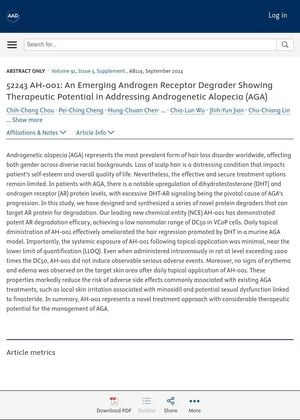52243 AH-001: An Emerging Androgen Receptor Degrader Showing Therapeutic Potential in Addressing Androgenetic Alopecia
September 2024
in “
Journal of the American Academy of Dermatology
”

TLDR AH-001 could be a safer and more effective treatment for hair loss.
The study introduces AH-001, a novel androgen receptor degrader, as a promising treatment for androgenetic alopecia (AGA). AH-001 effectively targets and degrades AR protein, showing potent efficacy in VCaP cells and reversing hair loss in a murine AGA model with minimal systemic exposure. Importantly, AH-001 did not cause serious adverse effects even at high doses in rats and showed no local skin irritation, addressing common side effects of current AGA treatments like minoxidil and finasteride. This suggests AH-001 has significant therapeutic potential for managing AGA.


